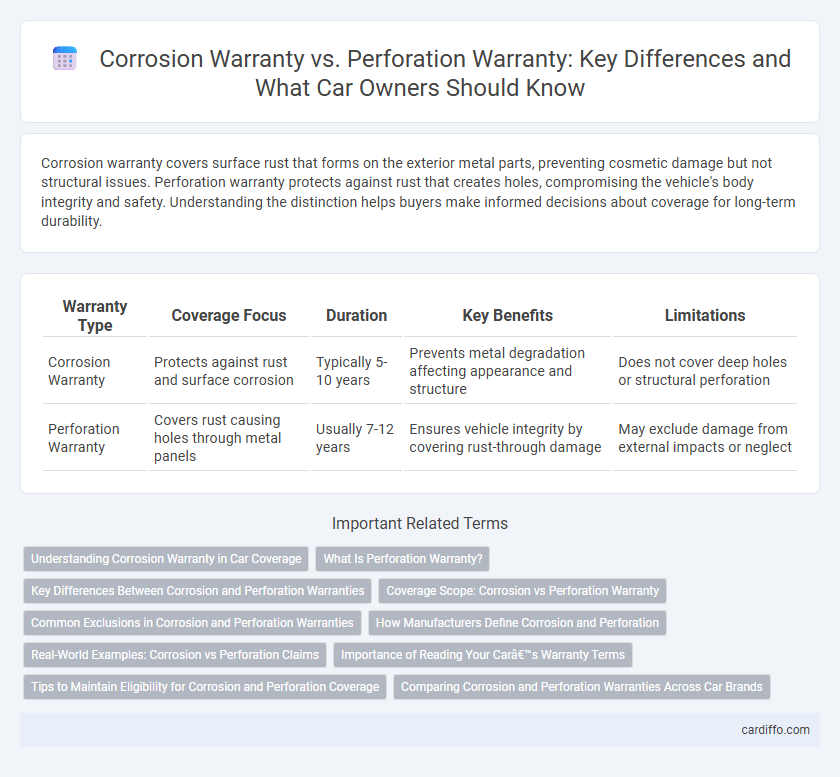Corrosion warranty covers surface rust that forms on the exterior metal parts, preventing cosmetic damage but not structural issues. Perforation warranty protects against rust that creates holes, compromising the vehicle's body integrity and safety. Understanding the distinction helps buyers make informed decisions about coverage for long-term durability.
Table of Comparison
| Warranty Type | Coverage Focus | Duration | Key Benefits | Limitations |
|---|---|---|---|---|
| Corrosion Warranty | Protects against rust and surface corrosion | Typically 5-10 years | Prevents metal degradation affecting appearance and structure | Does not cover deep holes or structural perforation |
| Perforation Warranty | Covers rust causing holes through metal panels | Usually 7-12 years | Ensures vehicle integrity by covering rust-through damage | May exclude damage from external impacts or neglect |
Understanding Corrosion Warranty in Car Coverage
Corrosion warranty in car coverage protects against rust damage affecting the vehicle's body or panels, excluding internal perforation. This warranty typically covers surface rust and corrosion that occurs from environmental factors like moisture or road salt. Understanding the terms helps car owners identify the extent of coverage and avoid costly repairs related to body corrosion.
What Is Perforation Warranty?
Perforation warranty specifically covers rust damage that causes holes or perforations through a metal surface, commonly found in automotive body panels. Unlike general corrosion warranties, which include surface rust and other types of rust damage, perforation warranties ensure protection against metal deterioration that compromises structural integrity. Manufacturers often provide perforation warranties to guarantee durability against significant rust damage, typically lasting several years depending on the product.
Key Differences Between Corrosion and Perforation Warranties
Corrosion warranties typically cover rust damages caused by environmental exposure on the metal surface without necessarily creating holes, while perforation warranties specifically protect against rust damage that results in actual holes or perforations in the material. Corrosion warranties often have shorter coverage periods and may exclude certain conditions like scratches or chips, whereas perforation warranties provide longer-term protection focusing on structural integrity compromise. Understanding these distinctions helps consumers select appropriate coverage based on potential rust damage severity and durability needs.
Coverage Scope: Corrosion vs Perforation Warranty
Corrosion Warranty covers surface rust and oxidation that compromise the metal's appearance and protective coating, preventing issues like peeling or flaking. Perforation Warranty specifically addresses rust that causes holes or penetrations through the metal, impacting structural integrity. The scope of Corrosion Warranty is broader for visible damage, while Perforation Warranty targets severe deterioration affecting functionality.
Common Exclusions in Corrosion and Perforation Warranties
Corrosion and perforation warranties commonly exclude damage caused by environmental factors such as salt spray, acid rain, and industrial pollutants, which accelerate metal degradation beyond normal conditions. Both warranties typically do not cover mechanical damages like dents or scratches that compromise the protective coating, nor do they protect against corrosion resulting from improper maintenance or installation errors. Additionally, perforation warranties often exclude damage limited to surface rust without full penetration, emphasizing the difference in coverage scope between the two warranty types.
How Manufacturers Define Corrosion and Perforation
Manufacturers define corrosion warranty as coverage against surface rust that causes aesthetic deterioration but does not compromise the integrity of the metal, while perforation warranty specifically covers rust that creates holes or full-thickness breaches in the material. Corrosion warranties typically protect against rust formation that can be visually detected but remain superficial, whereas perforation warranties focus on structural failure due to rust penetrating through the metal sheet. These definitions affect warranty claims, with perforation warranties often providing longer terms or stricter conditions given the severe damage implied.
Real-World Examples: Corrosion vs Perforation Claims
Corrosion warranty typically covers damage caused by rust and oxidation affecting the paint or surface layers, while perforation warranty addresses holes or breaches through the metal caused by rust penetrating the entire thickness. Real-world examples illustrate corrosion claims often involve surface blistering or flaking on vehicle panels, whereas perforation claims arise when rust creates visible holes that compromise structural integrity. Insurers often require detailed inspections to distinguish between superficial corrosion and true perforation before approving warranty claims.
Importance of Reading Your Car’s Warranty Terms
Understanding the distinction between corrosion warranty and perforation warranty is essential for vehicle owners to ensure proper coverage and claims. Corrosion warranty typically covers surface rust damage, while perforation warranty specifically addresses rust that causes holes through the metal. Thoroughly reading your car's warranty terms prevents misunderstandings and protects your investment from unexpected repair costs related to rust damage.
Tips to Maintain Eligibility for Corrosion and Perforation Coverage
To maintain eligibility for corrosion and perforation warranties, regularly inspect and clean the vehicle's undercarriage to remove salt, dirt, and moisture that accelerate rust formation. Apply protective coatings or rust inhibitors to vulnerable areas and promptly repair any scratches or dents to prevent corrosion from spreading. Keep detailed maintenance records and follow manufacturer guidelines to ensure compliance with warranty conditions.
Comparing Corrosion and Perforation Warranties Across Car Brands
Corrosion warranties typically cover rust damage caused by the oxidation of metal surfaces, while perforation warranties specifically protect against rust that creates holes in the vehicle body. Leading car brands like Toyota and Honda often offer corrosion warranties ranging from 5 to 12 years, whereas perforation warranties usually extend longer, sometimes up to lifetime coverage. Understanding the nuances between these warranties helps consumers select vehicles with the best protection against different types of rust-related damage.
Corrosion Warranty vs Perforation Warranty Infographic

 cardiffo.com
cardiffo.com